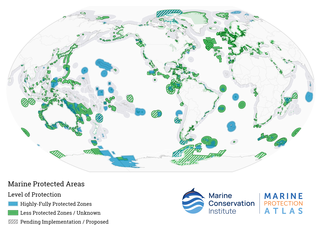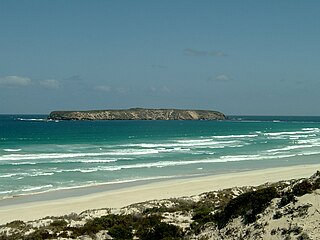Related Research Articles

Protected areas of Australia include Commonwealth and off-shore protected areas managed by the Australian government, as well as protected areas within each of the six states of Australia and two self-governing territories, the Australian Capital Territory and the Northern Territory, which are managed by the eight state and territory governments.

The Great Barrier Reef Marine Park protects a large part of Australia's Great Barrier Reef from damaging activities. It is a vast multiple-use Marine Park which supports a wide range of uses, including commercial marine tourism, fishing, ports and shipping, recreation, scientific research and Indigenous traditional use. Fishing and the removal of artefacts or wildlife is strictly regulated, and commercial shipping traffic must stick to certain specific defined shipping routes that avoid the most sensitive areas of the park. The Great Barrier Reef is the largest and best known coral reef ecosystem in the world. Its reefs, almost 3000 in total, represent about 10 per cent of all the coral reef areas in the world. It supports an amazing variety of biodiversity, providing a home to thousands of coral and other invertebrate species, bony fish, sharks, rays, marine mammals, marine turtles, sea snakes, as well as algae and other marine plants.

A marine protected area (MPA) is a protected area of the world's seas, oceans, estuaries or in the US, the Great Lakes. These marine areas can come in many forms ranging from wildlife refuges to research facilities. MPAs restrict human activity for a conservation purpose, typically to protect natural or cultural resources. Such marine resources are protected by local, state, territorial, native, regional, national, or international authorities and differ substantially among and between nations. This variation includes different limitations on development, fishing practices, fishing seasons and catch limits, moorings and bans on removing or disrupting marine life. MPAs can provide economic benefits by supporting the fishing industry through the revival of fish stocks, as well as job creation and other market benefits via ecotourism. The value of MPA to mobile species is unknown.

Hat Chao Mai National Park is a protected area located in the Sikao and Kantang Districts of Trang Province, Thailand. It is a marine national park. Established in 1981, it is an IUCN Category II protected area with coral reefs, and an area measuring 144,292 rai ~ 231 square kilometres (89 sq mi). The park has been designated as a Ramsar site since 2002. It has also been designated an Important Bird Area (IBA) by BirdLife International because it supports a significant population of large green-pigeons.

The Whidbey Isles Conservation Park is a protected area in the Australian state of South Australia which consists of seven islands located about 15 kilometres (9.3 mi) west-southwest of Coffin Bay on the lower Eyre Peninsula.
The Apollo Marine Park is an Australian Marine Park located in Bass Strait off the coast of Victoria and near Tasmania's King Island. The marine park was established in 2007 and covers an area of 1,184 km2 (457 sq mi). It is managed as part of the South-east Marine Parks Network.

Australian marine parks are marine protected areas located within Australian waters and are managed by the Australian government. These waters generally extend from three nautical miles off the coast to the outer limit of Australia’s Exclusive Economic Zone at 200 nautical miles while marine protected areas located closer in-shore are the responsibility of the states or the Northern Territory.

.
The Gulf of Carpentaria Marine Park is an Australian marine park in the Gulf of Carpentaria, offshore of Queensland and north of Mornington Island. The marine park covers an area of 23,771 km2 (9,178 sq mi) and is assigned IUCN category VI. It is one of 8 parks managed under the North Marine Parks Network.
The Gascoyne Marine Park is an Australian marine park offshore of Western Australia, west of the Cape Range Peninsula. The marine park covers an area of 81,766 km2 (31,570 sq mi) and shares its far eastern boundary with the Ningaloo Marine Park. The park is assigned IUCN category IV and is one of the 13 parks managed under the North-west Marine Parks Network.
The Dampier Marine Park is an Australian marine park offshore of Western Australia, north-east of Karratha. The marine park covers an area of 1,252 km2 (483 sq mi) and is assigned IUCN category VI. It is one of the 13 parks managed under the North-west Marine Parks Network.

The Argo-Rowley Terrace Marine Park is an Australian marine park offshore of Western Australia. It encompasses the protected areas of the Rowley Shoals, about 260 km (160 mi) north-west of Broome. The marine park covers an area of 146,003 km2 (56,372 sq mi) and is assigned IUCN management category VI. It is the largest of the 13 parks managed under the North-west Marine Parks Network.
The Kimberley Marine Park, formerly known as the Kimberley Commonwealth Marine Reserve and also known as the Great Kimberley Marine Park, is an Australian marine park offshore of Western Australia, near the Kimberley region. Proclaimed under the EPBC Act in 2013, the marine park covers an area of 74,469 km2 (28,753 sq mi) and is assigned IUCN category VI. It is one of the 13 parks managed under the North-west Marine Parks Network. It covers a number of state-managed marine parks.

Eastern Recherche Marine Park is a marine park adjacent to the Recherche Archipelago, close to the Western Australian Cape Arid National Park, and 135 km east of Esperance, on the south coast of Western Australia. It has consists of two sections: one of 5,010 km2 (1,930 sq mi) which is managed as an IUCN protected area category VI, and a further section of 15,565 km2 (6,010 sq mi) which is managed as an IUCN protected area category II. The maximum depth of the park is 6,000 metres (20,000 ft).
The Macquarie Island Marine Park is an Australian marine park surrounding Macquarie Island in the southwest Pacific. The marine park covers an area of 475,465 km2 (183,578 sq mi) and is assigned IUCN category IV. It is the largest of the 14 parks managed under the South-east Marine Parks Network.

The Ningaloo Marine Park is an Australian marine park offshore of Western Australia, and west of the Ningaloo Coast. The marine park covers an area of 2,435 km2 (940 sq mi) and is assigned IUCN category IV. It is one of the 13 parks managed under the North-west Marine Parks Network.
The marine protected areas of South Africa are in an area of coastline or ocean within the exclusive economic zone (EEZ) of the Republic of South Africa that is protected in terms of specific legislation for the benefit of the environment and the people who live in and use it. An MPA is a place where marine life can thrive under less pressure than unprotected areas. They are like underwater parks, and this healthy environment can benefit neighbouring areas.
The following index is provided as an overview of and topical guide to the protected areas of South Africa:
The Addo Elephant National Park Marine Protected Area is a marine conservation area in Algoa Bay, adjacent to the Nelson Mandela Bay Metropolitan Municipality, near Gqeberha, previously Port Elizabeth.
The Prince Edward Island Marine Protected Area is an offshore conservation region near the Prince Edward Islands in the exclusive economic zone of South Africa, nearly 2,000 km southeast of South Africa in the Indian Ocean. The MPA provides habitat for seals, killer whales, breeding seabirds and Patagonian toothfish.
References
- ↑ "Towards Networks of Marine Protected Areas - The MPA Plan of Action for IUCN's World Commission on Protected Areas" (PDF). IUCN. 2008-11-04. Archived from the original on 2012-10-08. Retrieved 2012-06-07.
- 1 2 "When is a Marine Protected Area really a Marine Protected Area". International Union for Conservation of Nature. 8 September 2012. Retrieved 29 May 2019.
- ↑ "Protected areas coverage in 2019". www.protectedplanet.net. Retrieved 4 June 2019.
- ↑ "Bazaruto in Mozambique". www.protectedplanet.net. Retrieved 4 June 2019.
- 1 2 3 4 5 6 7 8 9 10 11 12 13 14 15 16 17 18 19 20 "Meet South Africa's new Marine Protected Areas". www.marineprotectedareas.org.za. Retrieved 18 January 2019.
- 1 2 3 4 5 6 7 8 9 10 11 12 13 14 15 16 17 18 19 20 21 22 23 24 "Declarations". Pretoria: Government Printer. Retrieved 18 January 2019– via Centre for Environmental rights.
- 1 2 3 4 5 6 7 8 9 10 "Size distribution of marine protected areas". www.protectedplanet.net. Retrieved 30 May 2019.
- ↑ "Ao Phanganga in Thailand". www.protectedplanet.net. Retrieved 6 June 2019.
- ↑ "Had Chao Mai in Thailand". www.protectedplanet.net. Retrieved 6 June 2019.
- ↑ "Had Noparatthara - Mu Koh Phi Phi in Thailand". www.protectedplanet.net. Retrieved 6 June 2019.
- ↑ "Khao Laem Ya - Mu Koh Samed in Thailand". www.protectedplanet.net. Retrieved 6 June 2019.
- ↑ "Khao Sam Roi Yot in Thailand". www.protectedplanet.net. Retrieved 6 June 2019.
- ↑ "Lam Son in Thailand". www.protectedplanet.net. Retrieved 6 June 2019.
- ↑ "Mu Ko Ang Thong in Thailand". www.protectedplanet.net. Retrieved 6 June 2019.
- ↑ "Mu Ko Chang in Thailand". www.protectedplanet.net. Retrieved 6 June 2019.
- ↑ "Mu Ko Lanta in Thailand". www.protectedplanet.net. Retrieved 6 June 2019.
- ↑ "Mu Ko Preta in Thailand". www.protectedplanet.net. Retrieved 6 June 2019.
- ↑ "Ao Phangnga - Mu Koh Surin - Mu Koh Similan in Thailand". www.protectedplanet.net. Retrieved 6 June 2019.
- ↑ "Mu Ko Surin in Thailand". www.protectedplanet.net. Retrieved 6 June 2019.
- ↑ "Tarutao in Thailand". www.protectedplanet.net. Retrieved 6 June 2019.
- 1 2 3 4 5 6 7 8 9 10 "Most recent designations". www.protectedplanet.net. Retrieved 30 May 2019.
- ↑ "The Blue Belt programme". GOV.UK. Retrieved 2020-11-25.
- ↑ Grundy, Richard. "Tristan's Marine Protection Zone Announced". www.tristandc.com. Retrieved 2020-11-25.
- ↑ "Pacific Remote Islands in United States Minor Outlying Islands". www.protectedplanet.net. Retrieved 4 June 2019.
- ↑ "Cook Islands Marine Park in Cook Islands". www.protectedplanet.net. Retrieved 4 June 2019.
- ↑ "Poor Knights Islands in New Zealand". www.protectedplanet.net. Retrieved 4 June 2019.
- ↑ "Cape Rodney-Okakari Point in New Zealand". www.protectedplanet.net. Retrieved 4 June 2019.
- ↑ "Moutere Hauriri / Bounty Islands in New Zealand". www.protectedplanet.net. Retrieved 4 June 2019.
- ↑ "Moutere Mahue / Antipodes Island in New Zealand". www.protectedplanet.net. Retrieved 4 June 2019.
- ↑ "Tawharanui in New Zealand". www.protectedplanet.net. Retrieved 4 June 2019.
- ↑ "Tuhua (Mayor Island) in New Zealand". www.protectedplanet.net. Retrieved 4 June 2019.
- ↑ "Galápagos in Ecuador". www.protectedplanet.net. Retrieved 4 June 2019.
- ↑ "Charlie-Gibbs North High Seas MPA in Areas Beyond National Jurisdiction". www.protectedplanet.net. Retrieved 4 June 2019.
- ↑ "MAR North of the Azores High Seas MPA in Areas Beyond National Jurisdiction". www.protectedplanet.net. Retrieved 4 June 2019.